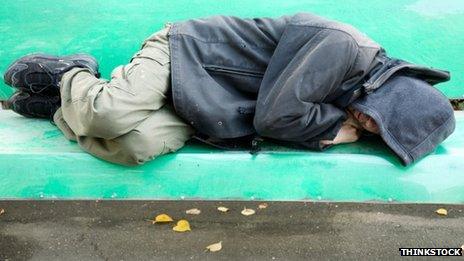NHS hospitals told to do more for homeless
- Published

NHS hospitals are being urged to do more to help homeless patients, in a report commissioned by the government.
The report acknowledges that some staff feel that patients' housing needs are beyond the remit of hospitals.
But it says a more intensive approach to the homeless can cut the cost of them repeatedly turning up as emergency cases.
The NHS Confederation said the problem could not be solved by the health service alone.
The report, by Homeless Link and St Mungo's, quotes the example of a special team at University College Hospital (UCH) in London which has helped save £100,000.
Homeless patients are thought to cost at least five times as much as other patients, because they often have multiple health problems and repeated admissions.
NHS hospitals are being told to identify homeless patients quickly, and involve housing teams or hostels in their care - rather than discharging them back onto the streets.
Greater need
Matt Harrison, who runs Homeless Link, said: "We asked 57 homeless people about their experiences in hospital.
"Their stories ranged from people being turned away by security guards at A&E, to others who were discharged onto the streets, sometimes without even shoes to wear.
"Sometimes they don't want to discuss their situation because of the level of prejudice they can face from nurses and other hospital staff.
"Homeless people have higher health needs - but they appear to receive worse treatment.
"We don't need a specialist service in every hospital - so long as they have the right plans and policies in place to help homeless people in their community."
'Expecting conflict'
At UCH, homeless patients are visited on a ward round by a GP, Dr Nigel Hewett, and other staff - including some who were previously without a home themselves.
Dr Hewett said: "Homeless patients often come into hospital expecting conflict, and worrying that they will be judged.
"Hospital staff are fearful as well - they worry about violence and also opening up a can of worms, in terms of finding problems that are insoluble.
"We've found that as a team we can quickly establish a relationship with the patient and help them."
Homeless patients often have illnesses connected with drug abuse and mental health issues.
The report said problems with heart, lungs and liver were common - as were injuries from falling over or being attacked.
The NHS Confederation's deputy chief executive, David Stout, said: "The NHS needs to up its game in providing more responsive care and support for homeless people.
"This issue is likely to become even more urgent as the economic outlook remains bleak and people struggle with financial pressures.
"But this is a problem the NHS cannot solve on its own.
"Homeless people have some of the most complex physical and mental health problems that many professionals will ever encounter."
- Published31 December 2011